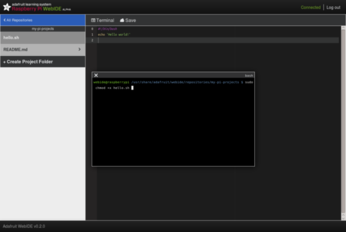Raspberry Pi WebIDE

Productivity Sauce
If you are serious about using your Raspberry Pi (RPi) as a platform for writing and testing code, you'll appreciate the WebIDE software developed by Adafruit. This server-based solution turns your RPi into a flexible coding environment which you can access and use from any machine with a browser. Although WebIDE is geared towards Python, it can handle other languages, including Ruby, JavaScript, and shell scripts. Better yet, WebIDE seamlessly integrates with the Bitbucket code hosting service.
Using the provided installer script, you can deploy WebIDE in an RPi in a matter of minutes. Alternatively, WebIDE can be installed manually, and the project's website provides instructions on how this is done. By default, WebIDE is configured to run on port 80, which can be a problem if your RPi is already running the Apache web server on that port. In this case, you need to configure WebIDE to run on another port. To do this, open the config.js file in the nano editor using the sudo nano /usr/share/adafruit/webide/config/config.js command, specify an alternative port, and restart WebIDE.
Once installed, WebIDE guides you through the process of linking the environment to your Bitbucket account. It also conveniently adds the my-pi-projects repository for you, so you can start coding right way. WebIDE features a built-in terminal which can be useful for running commands and testing the code. Every time you hit the Save button, WebIDE saves the changes and commits them to the repository.
WebIDE is still at a very early stage of development, so it might contain bugs. But even in its current form, it looks like a very promising project worth keeping an eye on.
Comments
comments powered by DisqusSubscribe to our Linux Newsletters
Find Linux and Open Source Jobs
Subscribe to our ADMIN Newsletters
Support Our Work
Linux Magazine content is made possible with support from readers like you. Please consider contributing when you’ve found an article to be beneficial.

News
-
Linux Foundation Reports that Open Source Delivers Better ROI
In a report that may surprise no one in the Linux community, the Linux Foundation found that businesses are finding a 5X return on investment with open source software.
-
Keep Android Open
Google has announced that, soon, anyone looking to develop Android apps will have to first register centrally with Google.
-
Kernel 7.0 Now in Testing
Linus Torvalds has announced the first Release Candidate (RC) for the 7.x kernel is available for those who want to test it.
-
Introducing matrixOS, an Immutable Gentoo-Based Linux Distro
It was only a matter of time before a developer decided one of the most challenging Linux distributions needed to be immutable.
-
Chaos Comes to KDE in KaOS
KaOS devs are making a major change to the distribution, and it all comes down to one system.
-
New Linux Botnet Discovered
The SSHStalker botnet uses IRC C2 to control systems via legacy Linux kernel exploits.
-
The Next Linux Kernel Turns 7.0
Linus Torvalds has announced that after Linux kernel 6.19, we'll finally reach the 7.0 iteration stage.
-
Linux From Scratch Drops SysVinit Support
LFS will no longer support SysVinit.
-
LibreOffice 26.2 Now Available
With new features, improvements, and bug fixes, LibreOffice 26.2 delivers a modern, polished office suite without compromise.
-
Linux Kernel Project Releases Project Continuity Document
What happens to Linux when there's no Linus? It's a question many of us have asked over the years, and it seems it's also on the minds of the Linux kernel project.


Raspberry Code